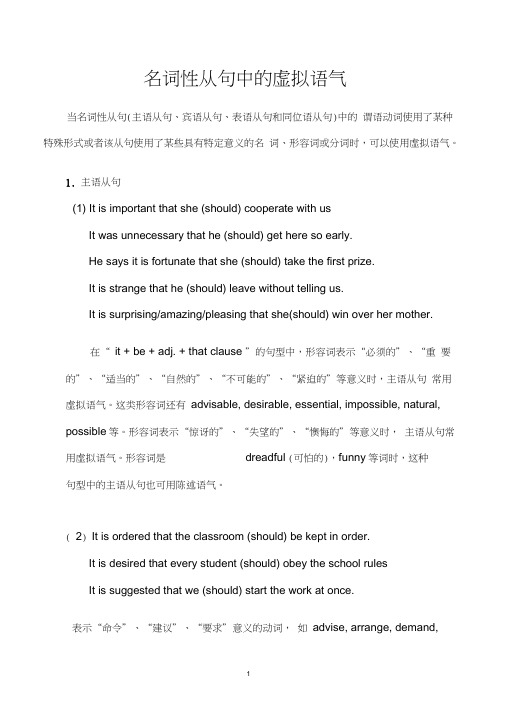虚拟语气在名词性从句中的运用
名词性从句中的虚拟语气

虚拟语气在表语从句中的用法
在系动词be+形容词引导的表语从句中
虚拟语气在表语从句中常用于表达某种假设或条件,如“The problem is that we should start our project earlier.”
在系动词be+名词引导的表语从句中
虚拟语气也可以用于描述某种结果或事实,如“The conclusion is that they would have won the game if they had scored more points.”
虚拟语气在主语从句中的用法
要点一
在It is/was+形容词/名词+that 引导的主语…
虚拟语气在主语从句中常用于表达某种假设或条件,如“It is crucial that we should act quickly.”
要点二
在It is/was+过去分词+that引导 的主语从句中
虚拟语气也可以用于描述某种结果或事实,如“It is said that he would have won the election if he had run a better campaign.”
虚拟语气的用法
表示与现实相反的情况
当描述与现实情况相反的情况时,使用虚拟语气来表达。
表示假设条件
在描述假设条件时,使用虚拟语气来表达。
表示个人意愿
在表达个人意愿时,使用虚拟语气来强调个人主观意愿。
02 名词性从句中的虚拟语气分类
与现在事实相反的虚拟语气
总结词
表示与现在事实相反的情况,假设的情况是假的,而实际情况是相反的。
详细描述
在虚拟语气中,与现在事实相反的情况通常通过使用动词的过去时态来表示, 如“If I were you, I would…”或“He suggested that we should leave early.”。这种虚拟语气常用于表达建议、要求、愿望等。
英语高考冲刺系列语法复习之考点七虚拟语气有讲解,有填空

英语高考冲刺核心语法复习考点七虚拟语气1.虚拟语气在条件句中的用法规则1:与现在事实相反,从句谓语用一般过去时(be动词用were),主句谓语用“would/should/could/might+动词原形”。
规则2:与过去事实相反,从句谓语用过去完成时had done,主句谓语用“would/should/could/might+have done”。
如:If I had done it in time,I should have had a good time.如果我及时做的话,我本该玩得很好。
(当时没能及时做)规则3:与将来事实相反,从句谓语用should do/were to do或一般过去时,主句谓语用“would/should/could/might +动词原形”。
如:If it were to rain tomorrow,I should not drive my car.如果明天下雨的话,我就不开车了。
(明天的情况还不知道)规则4:主句中的should通常用于第一人称,would可用于任何人称。
规则5:错综条件句:当条件从句的行为与主句表示的行为所发生的时间不一致时,主从句中动词的形式要根据其所表示的时间做出相应的调整,这就是所谓的错综条件下的虚拟语气。
如:If they had studied hard,they could do it easily now.如果他们以前努力学习的话,现在他们就能容易地解决这个问题了。
If he had not taken my advice,he wouldn't do it much better like this.如果他过去不听我的建议,他就不会像这样做得好多了。
规则6:虚拟语气的倒装:在条件句中,如果有were,had,should等,可省略if,把were,had,should等提到从句主语之前。
如:If he were to come,I would join him in the discussion.=Were he to come,I would join him in the discussion.如果他来,我将和他一道参加讨论。
名词性从句中的虚拟语气的用法解析

名词性从句中的虚拟语气当名词性从句(主语从句、宾语从句、表语从句和同位语从句)中的谓语动词使用了某种特殊形式或者该从句使用了某些具有特定意义的名词、形容词或分词时,可以使用虚拟语气。
1. 主语从句(1) It is important that she (should) cooperate with usIt was unnecessary that he (should) get here so early.He says it is fortunate that she (should) take the first prize.It is strange that he (should) leave without telling us.It is surprising/amazing/pleasing that she(should) win over her mother.在“ it + be + adj. + that clause ”的句型中,形容词表示“必须的”、“重要的”、“适当的”、“自然的”、“不可能的”、“紧迫的”等意义时,主语从句常用虚拟语气。
这类形容词还有advisable, desirable, essential, impossible, natural, possible等。
形容词表示“惊讶的”、“失望的”、“懊悔的”等意义时,主语从句常用虚拟语气。
形容词是dreadful (可怕的),funny等词时,这种句型中的主语从句也可用陈述语气。
( 2) It is ordered that the classroom (should) be kept in order.It is desired that every student (should) obey the school rulesIt is suggested that we (should) start the work at once.表示“命令”、“建议”、“要求”意义的动词,如advise, arrange, demand,propose, recomme nd, request, require等用被动语态时,主语从句要用虚拟语气。
名词性从句中的虚拟语气(讲义)

1. 通过本课的学习,能够全面掌握名词性从句中虚拟语气的基本用法。
2. 通过本课的学习,能够初步了解虚拟语气在不同类型名词性从句中的具体用法。
重点:掌握与坚持、命令、建议、要求四类词相关名词性从句中虚拟语气的用法。
难点:wish宾语从句中虚拟语气的用法。
近几年高考对于虚拟语气的考查主要集中在语法填空和书面表达中,语法填空涉及动词提示词的填空中多次出现对虚拟语气的考查,考查难度不大。
一、主语从句中的虚拟语气:1. It is/was + 形容词+ that从句当形容词为important, necessary,strange,natural,appropriate, proper, right, desirable, essential, surprising, unthinkable等或名词短语a good idea时。
2. It is/was + a pity / a shame / a surprise / no wonder + that从句3. It is demanded / suggested / ordered / required / ….that-clause注意:这种主语从句由连词that引导,虚拟语气为“(should)动词原形”。
其中should可省略。
should 常译成“应该、必须、竟然”。
It is important and necessary that we (should) master a foreign language.精通一门外语对我们来说是重要而且必要的。
It is proper that an independent inquiry (should) take place.进行独立调查很合适。
It is strange that he (should) refuse your help.他竟然拒绝你的帮助真是奇怪。
It is surprising that you (should) not understand me!你竟然不理解我,真令人吃惊!It’s a pity that you (should) miss a good chance.你竟然错过一个好机会真是遗憾。
英语虚拟语气在从句中的用法及其表达方式

英语虚拟语气在从句中的用法及其表达方式摘要虚拟语气是一种特殊的动词形式,用来表示说话人所说的话不是事实,而是一种假设、愿望、怀疑、建议、猜测、可能或纯粹的空想等。
虚拟语气在英语中有多种表达方式,可以用于不同类型的从句中,如条件从句、名词性从句、状语从句、定语从句等。
本文将介绍虚拟语气在从句中的基本用法和常见句型,并给出相应的例句。
一、虚拟语气在条件从句中的用法条件从句是由连词if或其他连词引导的表示条件或假设的从句。
条件从句可以分为四种类型,分别对应不同的虚拟语气形式:类型条件从句主句含义例句真实条件if + 一般现在时一般将来时/情态动词+动词原形表示可能发生或实现的情况If it rains tomorrow, we willstay at home.与现在事实相反if + 一般过去时/过去进行时would/could/might/should+动词原形表示与现在事实相反或不可能实现的假设If I were you, I would studyharder.与过去事实相反if + 过去完成时/过去完成进行时would/could/might/should+have+过去分词表示与过去事实相反或无法改变的假设If he had studied harder, hewould have passed theexam.与将来事实相反if + should/were to+动词原形/一般过去时would/could/might/should+动词原形表示对将来不太可能发生或实现的假设If I should win the lottery, Iwould travel around theworld.二、虚拟语气在名词性从句中的用法名词性从句是指在句子中充当名词功能的从句,包括主语从句、宾语从句、表语从句和同位语从句。
名词性从句中可以使用虚拟语气来表示说话人的愿望、建议、命令、要求等。
1. 虚拟语气在宾语从句中的用法宾语从句是指在复合句中作主要成分动词或介词的宾语的从句。
虚拟语气在名词性从句中的运用

03
与将来事实相反的 假设
使用一般过去时态或过去进行时 态,如“If I should win the lottery, I would buy a new car.”
02
虚拟语气在名词性从句 中的用法
表示与事实相反的情况
表示与现在事实相反的情况
使用"if"引导的虚拟语气,从句用一般过去时,主句用"would+动词原形"。例如:"If I were you, I would choose to study abroad."
bought tickets."
在表语从句中的用法
要点一
在表语从句中表示与事实相反的 情况
使用"if"引导的虚拟语气,从句用一般过去时,主句用 "would+动词原形"。例如:"The reason why he failed the exam is that if he had studied harder, he would have passed it."
虚拟语气在名词性从句中的运用
目录
• 虚拟语气在名词性从句中的基本概念 • 虚拟语气在名词性从句中的用法 • 虚拟语气在名词性从句中的特殊情况 • 虚拟语气在名词性从句中的注意事项
01
虚拟语气在名词性从句 中的基本概念
虚拟语气的定义
虚拟语气是一种特殊的动词形式,用 于表示与实际情况相反的假设或建议。
语境的适应性
使用虚拟语气时,应考虑语境的适应性。虚 拟语气通常用于表示假设或与事实相反的情 况,因此应避免在不适合的语境中使用。
例如,“If the weather were fine, we would go out.”(如果天气好,我们就出
名词性从句和虚拟语气

03
结果语气
在描述结果或与预期相反的结果时,使用虚拟语气可以强调结果的非真
实性或与预期的差距,例如“如果我早点行动,结果会更好。”
04
CATALOGUE
虚拟语气的特殊形式
虚拟语气在倒装句中的应用
虚拟语气在倒装句中通常用于 表示与事实相反的情况,或者 表达主观的愿望、假设等。
倒装句中的虚拟语气通常使用 助动词的过去时态(如 “had”、“were”等)和动 词的过去分词形式。
05
CATALOGUE
虚拟语气与真实语气之间的区别和联系
虚拟语气与真实语气的语义对比
虚拟语气
表示与实际情况相反的情况,或 者表示主观的愿望、建议、猜测 等。
真实语气
表示实际情况,描述事实或陈述 观点。
虚拟语气与真实语气的使用场合对比
虚拟语气
通常用于表达假设、条件、祝愿、请 求等场合,强调主观意愿或假设的情 况。
名词性从句和虚拟 语气
目录
• 名词性从句的种类 • 虚拟语气的基本概念 • 虚拟语气的用法和注意事项 • 虚拟语气的特殊形式 • 虚拟语气与真实语气之间的区别和联系
01
CATALOGUE
名词性从句的种类
主语从句
主语从句在句子中作主语,常用 形式为“引导词+主语+谓语” ,如“It is important to learn
同位语从句可以由连词、关系代词或关系副词引导,如“that、ere”等。
同位语从句在句子中表示一个完整的概念或事实,通常放在名词或代词 后面。
02
CATALOGUE
虚拟语气的基本概念
虚拟语气在条件状语从句中的应用
虚拟语气在条件状语从句中用来表示假设条件,与现实情况相反。在英语中,通 常使用“if”引导条件状语从句,并使用虚拟语气。
高中英语虚拟语气用法小结

高中英语虚拟语气用法小结虚拟语气用法小结白杨林河南省社旗县第二高级中学虚拟语气表示说话人所说的事或话不是事实,而是一种假设,愿望,怀疑或推测。
它主要用于条件从句,让步从句和名词性从句中。
一、虚拟语气在条件句中的用法:虚拟语气常用在条件句中,表假设的情况与事实相反或不太可能实现,这种句子称为虚拟条件句。
可分为下列几种情况:1、假设的条件与现在的事实恰好相反,主从句的谓语动词应属:if主+动词过去式或were…,主+would/should/could/might+v、(原形)(主句中should通常只用作第1人称)。
例如:ifitwerenotforthesmowyweather,wewouldbeallright.例1、ifiyou,iwouldgowithhimtotheparty.a、wasb、werec、hadbeend、willbe析:该句为if鼓励的条件句,从主语谓语看看“wouldgo”(就是与现在事实恰好相反),套用上边句型,从句谓语应属动词过去式,若是be动词应属were,所以该题答案应属b。
2、假设的条件与过去事实相反,其句子结构应为:if+主+haddone…,主+would/could/should/might+havedone…基准2、morecareful,hisshipwouldnothavesunk.a、ifthecaptainwereb、hadthecaptainbeenc、shouldthecaptainbed、ifthecaptainwouldhavebeen析:该题题干部分有一谓语动词为wouldnothavesunk,由此可知是对过去事情的虚拟,便可推出从句的谓语动词应为haddone形式,再看选项,含用心爱心专心有haddone的只有b,该题正确答案即是b。
(当if引导的虚拟条件中有were,had,should时,可省略if,把were,had,should提到主语之前)。
- 1、下载文档前请自行甄别文档内容的完整性,平台不提供额外的编辑、内容补充、找答案等附加服务。
- 2、"仅部分预览"的文档,不可在线预览部分如存在完整性等问题,可反馈申请退款(可完整预览的文档不适用该条件!)。
- 3、如文档侵犯您的权益,请联系客服反馈,我们会尽快为您处理(人工客服工作时间:9:00-18:30)。
与现在相反: as if sb did sth / as if sb were… 与将来相反: as if sb would / could / might do 与过去相反: as if sb had done sth
She looked after the boy as if he were her own son. 她照顾这男孩就像自己的儿子一样。
8. When a pencil is partly in a glass of
water, it looks as if it ____.
A. breaks
B. has broken
C. were broken D. had been broken
Homework: 1. 走进: P 35- 36 虚拟语气专项练习 2. 翻译后5句
2. Tom suggested that Ann ___ the house.
A. sell
B. sold
C. shall sell
D. would sell
3. I wish this bus ___ to the university.
A. go
B. went
C. has gone
D. had gone
他坚称他的儿子是无辜的。(innocent) 3) He insisted that _h_is__s_o_n__w_a_s_i_n_n_o_c_e_n_t.
虚拟语气在宾语从句中
2 wish引导的宾语从句: 1) 与现在事实相反:
wish that sb did sth wish that sb were… 2) 与过去事实相反: wish that sb had done sth 3) 与将来事实相反: wish that sb would / could / might do sth
He wished Ch_a_r_li_e_h_a_d_n__’t_t_a_k_e_n_t_o_o__m_u_c_h_______ me_d_i_c_in_e__y_e_s_t_e_rd_a_y_.___.
虚拟语气在宾语从句中
3. 在would rather(宁愿) 引导的宾语从句中 从句表与过去或将来相反: would rather sb did sth would rather sb were… 从句表与过去相反: would rather sb had done sth 我宁可他明天来。 I would rather___h_e__c_a_m_e__t_o_m_o_r_r_o_w___. 我宁可他(当时)没那样做。 I would rather ___h_e_h_a_d__n_’t_d_o_n__e_t_h_a_t _____.
但: It is time for sb to do sth It is time for you to leave here.
1. If only I ___ to my parents! (But I didn’t.)
A. listened
B. had listened
C. should listen D. would listen
你们知道你们要严密看守犯人的命令吗? Do you know the order that
y_o__u_(_s_h_o_u_l_d_) _k_e_e_p_a__c_lo_s_e__w_a_t_c_h__o_n_t_h_e p__ri_s_o_n_e_r_s_?_________
五. 虚拟语气在 as if 从句中
虚拟语气在宾语从句中
[例] 1.我希望她会站在我这一边。
I wish she _w__o_u_l_d_b_e__o_n__m_y__s_id_e_________.
2.我希望我年轻十岁。 I wish __I _w_e_r_e_t_e_n_y_e_a_r_s_y_o__u_n_g_e_r___. 3.他希望昨天Charlie没有吃太多的药。
虚拟语气在宾语从句中
[例] 1) 老师建议我们课后把黑板擦了。
The teacher suggested that _w_e__(s_h_o_u__ld_)_c_l_e_a_n_t_h_e__b_la_c_k_b_o_a_r_d____ _a_ft_e_r_c_l_a_s_s_. _____.
2)他坚持要我们大家想尽办法按时去那儿。 He insisted that _a_ll_o_f_u__s_(_s_h_o_u_ld__) _b_e_t_h_e_r_e_o_n________ _ti_m_e__b_y__a_ll_m__e_a_n_s_. __
2.重要的是我们要照顾好病人。 It’s important that
w__e_(_s_h_o_u_l_d_) _ta_k_e__g_o_o_d__c_a_re__o_f_t_h_e_p_a_t_i_e_n_t .
三. 虚拟语气在表语从句中
One’s suggestion / advice / proposal is that… One’s command / order is that… One’s request / requirement / demand is that …
6. – Have you ever been to Beijing? -- No, but I wish I ___. A. have B. will C. do D. had
7. I don’t think it is high time that you __. A. will go B. went C. go D. must go
例: 要是他有点幽默感就好了。 If only he had a sense of humor.
要是他们没犯那个愚蠢的错误就好了。 If only they hadn’t made the stupid
mistake.
2. It’s (high) time that sb did sth 你该离开这里了。 It’s time that you left here.
4. Simon looks as though he never ___ a square meal(吃得饱), though his parents feed him very well. A. get B. getting C. got D. should get
5. He is talking so much about America as if he ___ there. A. had been B. were C. was D. been
He speaks to us as if he had been there. 他给我们讲的好象他去过那儿。
六. 虚拟语气中的几个特例
1. If only 要是...就好了 If only sb did sth / sb were … If only sb would do sth If only sb had done sth
===> sb (should) do sth
我们的建议是你应准时到达那里。
Our suggestion is that you (should) be there on time.
四. 虚拟语气在同位语从句中
学生应该学一些实用性的东西这个建议是值 得考虑的。(suggestion)
The suggestion that _s_t_u_d_e_n_t_s_(_s_h_o_u_l_d_) _le_a_r_n__s_o_m_e_t_h_i_n_g___ _p_r_a_c_t_ic_a_l_i_s_w__o_rt_h__c_o_n_s_id_e_r_i_n_g_______
Байду номын сангаас
二. 虚拟语气在主语从句中
It is important / vital that… It is necessary / essential that… sb (should) do sth [例] 1. 我们有必要现在出去散散步。 It’s
_n_e_c_e_s_s_a_r_y_t_h_a_t_w_e__(s_h__o_u_ld_)_g__o_f_o_r_a__w_a_lk___ _n_o_w_.__________.
Subjective Mood (2)
虚拟语气在名词性从句中的运用
一:虚拟语气在宾语从句中
1. 坚决要求: insist that…
命令: command / order that…
要求: require / demand / ask / request that…
建议: suggest / propose / advise / recommend /
move that…
== sb (should) do sth should 可省略
虚拟语气在宾语从句中
2. insist 表“坚决要求”时, 用(should) + do
insist 表“坚称,坚持说”时,用陈述语气, 表示事实
suggest 表示“建议”时,用(should) + do
suggest 表示“表明、暗示”时,用陈述语 气。
